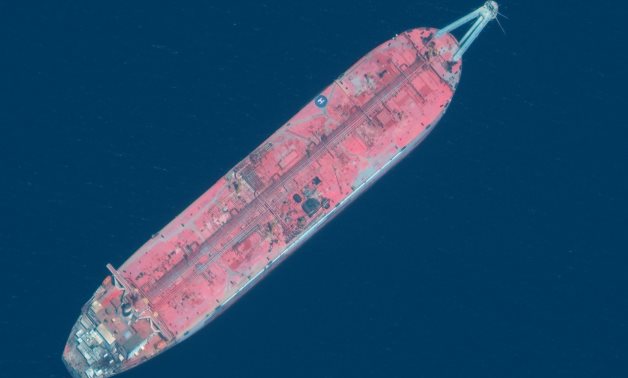
A handout satellite image released July 15, 2020 shows a close up view of FSO Safer oil tanker anchored off the marine terminal of Ras Isa, Yemen June 17, 2020. Picture taken June 17, 2020 - REUTERS
CAIRO - 10 August 2020: The Arab world is facing another ticking bomb, not less dangerous than the deadly explosion of Beirut port that claimed lives of hundreds of people and injured thousands; off the coast of Houthis-controlled city of Hodeida, floating oil storage and offloading vessel Safer could spill 1.148 million barrels into the Red Sea, endangering the environmental ecosystem and the marine life.
Secretary-General of the League of Arab States Ahmed Aboul Gheit warned again of the danger of Safer, saying that “the Lebanon disaster and the terrible devastation it caused reminds us of the danger of this floating oil tank off the Yemeni coast, which has not been serviced since the outbreak of the civil war in 2015.”
He called upon the Security Council of the United Nations to immediately intervene to enable the United Nations team board supertank the reservoir and take action. Maintenance required.
Two days ago, the US embassy in Yemen warned against the possible spill of oil, accusing the Iran-backed houthis of The Houthis of failing to fulfill its deal to allow a team from the United Nations to board the ship.
The Houthis have failed to follow through on their agreement to allow a @UN team onto the Safer. They are courting environmental and humanitarian disaster by obstructing & delaying. For the good of #Yemen & the region, the Houthis must allow the UN aboard the Safer. https://t.co/Qh55FN6BmT
— NSC (@WHNSC) August 8, 2020
The supertanker has been owned by the Yemen Petroleum Company for 30 years to be used as a go to work as an oil export station. However, the tanker has been controlled by the Houthis since 2015 when the group seized and controlled over Sanaa and Hodeidah. Since then, maintenance works have been suspended and caused a leak in the ship. Fish, coral reefs, shellfish, and other marine creatures are vulnerable to death as oil spills are creating an insulating layer that prevents sunlight from reaching marine species.
Member of the Supreme Political Council, Mohammed Ali Al-Houthi stated that the warnings issued by US and allies to the Saudi Arabia regarding Safer are not for fear for the environment, blaming them for the ship crisis. He said that the Saudi-led coalition and its allies blocked the ship by declaring Sanaa and Safer a military targets, Houthis media outlet Al-Masirah reported on Monday.
In a statement issued mid-July 2020, the United Nations Environment Programme (UNEP) chief, Inger Andersen, stated that the Japan-manufactured ship sprung a leak in May and the engine room filled with water. She warned that the oil on the ship could spill in water.
Meanwhile, millions of Yemenis are endangered by the ship as most of 1.8 million people depend on humanitarian aid, said Under-Secretary-General for Humanitarian Affairs and Emergency Relief Coordinator Mark Lowcock on his official Twitter account on July 15.
A spill from the decaying oil tanker, SAFER, off the #Yemen coast could directly affect 1.6 million Yemenis - many of whom already depend on humanitarian aid. I briefed the UN Security Council on the situation. The UN remains ready to address the problem: https://t.co/tP94gojQKn pic.twitter.com/zBsGVekV5h
— Mark Lowcock (@UNReliefChief) July 15, 2020
However, the Environmental Protection Agency, which affiliated to the Houthis accused the Saudi-led coalition in Yemen of being intransigent in preventing the maintenance of the Safer oil ship as the agency has asked the international community to supply the tanker with diesel to run the generators on which it relies, filtering equipment for tank ventilation to prevent the accumulation of flammable gases, according to a statement issued by Al-Masirah on July 11, 2020.
Comments
Leave a Comment